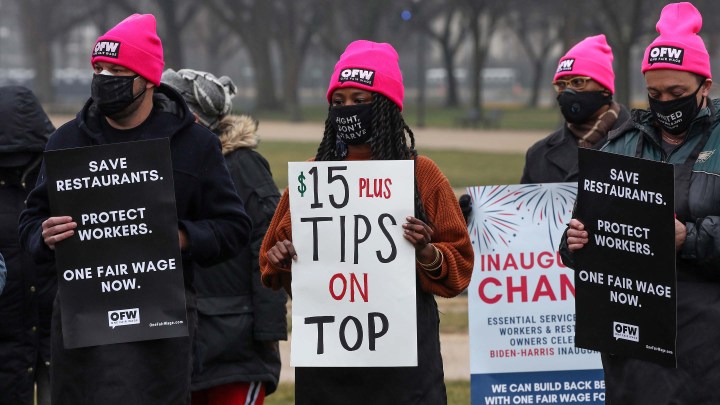
$15 minimum wage would reduce poverty but cut jobs, CBO says
$15 minimum wage would reduce poverty but cut jobs, CBO says

A new government study puts into sharp relief the benefits and costs of raising the federal minimum wage to $15 an hour. President Joe Biden has been pushing the $15 floor as part of COVID relief.
Marketplace’s Nancy Marshall-Genzer in Washington has more on this. The following is an edited transcript of her conversation with “Marketplace Morning Report” host David Brancaccio.
David Brancaccio: Tell me more about this analysis.
Nancy Marshall-Genzer: The study is from the nonpartisan, Congressional Budget Office. The CBO study says a $15 an hour minimum wage would boost the earnings of 17 million workers and pull 900,000 people out of poverty.
Brancaccio: Yet, drop the other shoe here.
Marshall-Genzer: This is where those trade-offs you mentioned come in. The CBO report also says almost 1.5 million people would lose their jobs because of the $15 an hour minimum wage. Higher wages would increase the cost of doing business, so companies would raise prices, producing fewer goods and services and laying off some workers. The report says the higher prices and wages would also cost the government and raise the budget deficit.
Brancaccio: How have supporters of the $15/ hour minimum wage reacted to the study?
Marshall-Genzer: We talked to Heidi Shierholz about it. She’s a labor economist at the Economic Policy Institute. She agrees with a lot of the CBO report, but she says the CBO overstates what a higher minimum wage would cost the government.
Heidi Shierholz: That said, even if you take their numbers at face value, they still find that for a very relatively low price to the federal government, you’d get a minimum wage increase that did really important things for the U.S. economy — pulling people out of poverty, reducing inequality, getting more income to low-income people.
Marshall-Genzer: So she’s saying even if there are trade-offs, they’re worth it.
There’s a lot happening in the world. Through it all, Marketplace is here for you.
You rely on Marketplace to break down the world’s events and tell you how it affects you in a fact-based, approachable way. We rely on your financial support to keep making that possible.
Your donation today powers the independent journalism that you rely on. For just $5/month, you can help sustain Marketplace so we can keep reporting on the things that matter to you.

















